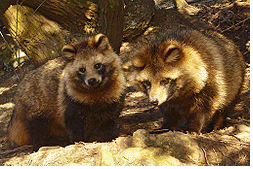Since the old days, Japanese people have had friendly feelings toward tanuki, the raccoon dog. Its taxonomy is raccoon dog genus, dog family and scientific name is Nyctereutes procyonoides. It length is 50~60cm,weight is 3~10kg and life is 3~5years.

It distribution is Russia, China and Japan. Recently, raccoon dog lives in Poland, Germany, Finland, France and Italy. It was imported for fur, and has since gone wild.Also, Japanese raccoon dog has two species. First is Ezo raccoon dogs in Hokkaido. Second is Hondo raccoon dogs in Honshu, Kyushu and Shikoku. Ezo raccoon dog’s fur and limbs are longer than Hondo raccoon dog’s. The raccoon dog is seen villages mountains, superhighways and dwellings in Kochi. These are Hondo raccoon dogs.
Their shape is thickset, short paw, thick tail, gray-brown body color and black around eyes.
It is nocturnal and it lives in forest. It lives singly or in pair. Pairs continue till one partner die. Also, it doesn’t have a specific territory. Raccoon dog is omnivorous, eating for example mice, frogs, birds, eggs, fish, insects and fruit, etc.
It is of the carnivorous , or cat, order whose common ancestor lived in trees in the forest, but left the habitat of grassy plain to forests to look for game. It evolved into various species. The tanuki is is dog genus.Then raccoon dog adapted to life in the forest. It retains the characteristics of primitive dog genus animal.
In the modern era, raccoon dog was almost driven to extinction because of indiscriminate hunting.The raccoon dog was over hunted by people for fur product. Recently mountains and forests are declining, so raccoon dog are seen at the city. They live in drains, and eat the kitchen garbage. As a result they are increasingly involved in traffic accidents all over Japan.
By the way, the raccoon dog has many local name. For example, in farm village around Kanto people call them Mujina. Other local names include Anappo, Kainehori, Danza, Tonchibo, Hachimujina, Banbuku, Bo-zu, Mameda and Yomono. These names are based on action and appearance.
Also there is a famous Japanese expression using raccoon dog, “Tanukineiri”. It means pretending to be asleep. This language origin is from when the hunter shoots a gun, and the raccoon dog was so surprised by the report of a gun that it fainted. The hunter thought he had downed a raccoon dog, and he was careless. Just then, raccoon dog wake up and run away. This old story shows cowardly character of raccoon dog.
Raccoon dog is very popular among Japanese people!


I am form Kochi, so I see raccon usually. I am very sad that I see the dead body of raccon.So I thought that we keep the forest for life-and-death of raccon.
LikeLike
This article is very easy to understand and it is very interesting.I thought it is a romantic tale that pairs continue till one partner die.I thought it is very interesting because there are variously how to call in japan.
LikeLike
I see it animal a few days ago in animal park.I surprised about it animal’s life is 3~5 year.I think it is a long life.
LikeLike
I surprise that Raccoon dog has many lacal names.
I understand that Raccoon dog lives widely.
LikeLike
Sure! I think that raccoon dog is so popular. I like it because it is so cute. There are a lot of it in Kochi.
LikeLike
I didn’t know origin of “Tanukineiri”. This story is very interesting. I will say everyone that I studyed today.
LikeLike
I don’t see it many times. So, I was excited this article. I did’t know that the tanuki is dog genus.
LikeLike
The life is unexpectedly short!!
I see that tanuki has meny local name.
LikeLike
I would often see This animal in my hometown.I interests in the name. I don’t know all another name. Why tanuki have many another name?
LikeLike
Raccoon dog is very cute animal!
I often did “Tanukineiri” when I was child.
LikeLike
Tanuki is big to my surprise.
Their grafic is cute. I was surprised they eat everything.
LikeLike
I understood that tanukis are distributed alot of countries.
I didn’t know that tanukis eat many animals.
So I was surprised.
LikeLike
Tanuki was able to be understood.
Tanuki is heavy.
LikeLike
I dont see the real thing . I think that a raccoon dog is very pretty.
LikeLike
It was able to know the Tanuki in detail by reading this article.
I think that it is a very serious situation that threatens Tanukin’s ecology by the human influence.
LikeLike